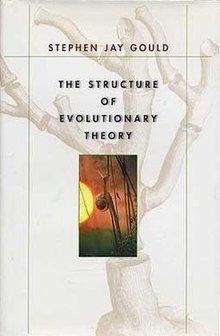The Structure of Evolutionary Theory

Cover of the first edition
|
|
| Author | Stephen Jay Gould |
|---|---|
| Country | United States |
| Language | English |
| Subject | Macroevolutionary theory |
| Publisher | Belknap Press |
|
Publication date
|
March 21, 2002 |
| Media type | Print (Hardcover) |
| Pages | 1,433 |
| ISBN | |
| OCLC | 47869352 |
| 576.8 21 | |
| LC Class | QH366.2 .G663 2002 |
| Preceded by | The Lying Stones of Marrakech |
| Followed by | I Have Landed |
The Structure of Evolutionary Theory (2002) is Harvard paleontologist Stephen Jay Gould's technical book on macroevolution and the historical development of evolutionary theory. The book was twenty years in the making, published just two months before Gould's death. Aimed primarily at professionals, the volume is divided into two parts. The first is a historical study of classical evolutionary thought, drawing extensively upon primary documents; the second is a constructive critique of the modern evolutionary synthesis, and presents a case for an interpretation of biological evolution based largely on hierarchical selection, and the theory of punctuated equilibrium (developed by Niles Eldredge and Gould in 1972).
According to Gould, classical Darwinism encompasses three essential core commitments: Agency, the unit of selection (which for Charles Darwin was the organism) upon which natural selection acts;efficacy, which encompasses the dominance of natural selection over all other forces—such as sexual selection, genetic drift, and biological constraints—in shaping the historical, ecological, and structural influences on evolution; and scope, the degree to which natural selection can be extrapolated to explain biodiversity at the macroevolutionary level, including the evolution of higher taxonomic groups.
Gould described these three propositions as the "tripod" of Darwinian central logic, each being so essential to the structure that if any branch were cut it would either kill, revise, or superficially refurbish the whole structure—depending on the severity of the cut. According to Gould "substantial changes, introduced during the last half of the 20th century, have built a structure so expanded beyond the original Darwinian core, and so enlarged by new principles of macroevolutionary explanation, that the full exposition, while remaining within the domain of Darwinian logic, must be construed as basically different from the canonical theory of natural selection, rather than simply extended."
...
Wikipedia
